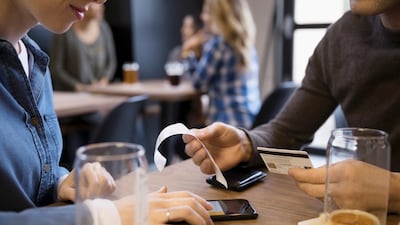My favourite go-to restaurant has changed its policy on the use of a two-for-one voucher app. The voucher is now deducted from the basic price of the main meal without the municipality fee, service charge and VAT. Then they add the 25 per cent back to the total bill, even though the menu has all taxes included in the prices. Therefore, it’s not two-for-one anymore. This made my steak Dh45 more expensive than I normally pay. Is this correct?
ES Dubai
The treatment of vouchers and discounts within VAT legislation is complicated and on first read can appear ambiguous. As with most legal issues, it’s all about interpretation and the response below is my personal interpretation.
My experience this year is that most food and beverage outlets participating in the two-for-one app concept are removing the cost of the second meal from the bill in full, without adding back the taxes on the free menu item.
The correct VAT treatment hinges on whether the free item is considered to be a discount or exchanged for a voucher. I’ve read the legislation, Executive Regulations and various Federal Tax Authority-issued guides on this subject and my opinion is that although these two-for-one deals are commonly referred to as “vouchers”, they do not fall under that definition from a legal VAT perspective, rather VAT should be accounted for as a discount.
Article 40 of the VAT law and Article 28 of the Executive Regulations cover discounts and vouchers. It says in the case of a discount, the value of supply, which is the amount on which you pay VAT, may be reduced if the customer has benefited from the reduction in price and the supplier funded the discount. The value of a discount is the amount by which the price paid is reduced.
Article 40 defines a voucher as any instrument that gives the right to receive goods against a stated value, including the right to receive a discount on the price of the goods. It appears this is the part of that law that your favourite restaurant is following.
However, the two-for-one vouchers we refer to here do not have any stated monetary value and the law clearly says that a voucher must include the monetary value for which it may be redeemed and that this value is identifiable at the time the voucher is issued. That’s clearly not the case here. The vouchers are not supplied by the restaurant themselves and have no value until used. Many F&B outlets offer two-for-one deals without any vouchers involved and outlets included in the apps can change mid year.
The FTA have issued a series of guides on their website, one of which covers the VAT percentage on discounted items and specifically mentions “buy one, get one free” deals.
The guide says that in case of discounts on the regular sale price, VAT will be applicable and included in the discounted price and not the original price. So, my personal conclusion is that these deals are discounts rather than vouchers and VAT should not be applied on the free item.
______
Read more:
VAT q&a: 'Should our dormant real estate business be registered with the FTA?'
VAT q&a: 'Can I reclaim VAT charged by my bank on its fees?'
VAT q&a: 'A GIBAN number appears on my FTA page. What is that?'
Dubai Economy clarifies VAT addition to Fitness First memberships
_______
The company I work for has received a VAT invoice from a consultant based outside the UAE. Can we reclaim this VAT? CM, Abu Dhabi
You don’t mention whether you have been charged UAE VAT or VAT from another regime. It is possible the consultant has a number of clients in the UAE and has therefore registered for UAE VAT. Non-resident companies have similar obligations to register for VAT as UAE resident companies. If the consultant is charging VAT at 5 per cent and has a TRN number you can check whether he is registered for UAE VAT by using the TRN verifier on the FTA’s website.
If the company is registered with the FTA then you can reclaim the VAT in exactly the same way as if charged by a UAE resident company.
It is more likely that the consultant is based in a location that operates its own VAT regime and he has charged you local VAT. For example, if you have been charged UK VAT then you cannot reclaim this unless you are registered for the tax in the UK. Note that many VAT regimes operate similarly, and I would ask him to check he is obligated to charge you VAT. A consultant operating here, supplying services to an overseas company is likely to be able to treat this as an export of services, which attracts zero per cent VAT.
Lisa Martin, a chartered accountant with over 20 years commercial finance experience, is the founder of accounting, auditing and VAT consultancy, The Counting House. Email any VAT queries to pf@thenational.ae

